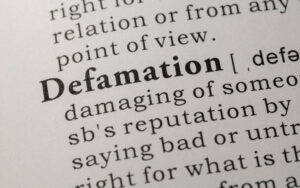Knowing Your Rights and Legal Options Amid Divorce-Related Defamation
During a Divorce Process, False Statements Made Out of Emotion Can Cause Harm, Affect Future Opportunities, and Lead to Defamation Lawsuits in New Jersey
 Contentious divorces have the potential to cause all kinds of drama. When emotions run high and one or both parties are intent on destroying the other, many monsters can come out. One such monster is defamation. Defamation is the act of damaging someone’s reputation with a lie. When a destructive lie is written or otherwise published, it is called libel. When it is spoken, it is called slander. Divorcing couples are known to say many things they don’t mean or that aren’t true in the heat of the moment and the hurt of the circumstance. When their falsehoods cause grave harm to your reputation and impact your present or future outcomes, you may be able to sue them for defamation, though certain even slanderous speech is protected in a courtroom.
Contentious divorces have the potential to cause all kinds of drama. When emotions run high and one or both parties are intent on destroying the other, many monsters can come out. One such monster is defamation. Defamation is the act of damaging someone’s reputation with a lie. When a destructive lie is written or otherwise published, it is called libel. When it is spoken, it is called slander. Divorcing couples are known to say many things they don’t mean or that aren’t true in the heat of the moment and the hurt of the circumstance. When their falsehoods cause grave harm to your reputation and impact your present or future outcomes, you may be able to sue them for defamation, though certain even slanderous speech is protected in a courtroom.
Defamation lawsuits are not usually recommended as a way to go, especially if you share children, who could be even more emotionally impacted by a contentious lawsuit than they are by the divorce. However, there are cases in which suing for defamation is absolutely appropriate. Contact our team at The Bronzino Law Firm today for a confidential and free consultation to discuss your concerns, and read on to learn more about defamation during divorce.
The Burden of Proof and Defamation Allegations in NJ Divorce
If one spouse accuses the other of domestic violence, knowing it is not true but done in service of ruining the other’s reputation, the accuser could risk a marital tort claim of defamation. The one claiming defamation carries the burden of proving defamation. The burden of proof requires that the individual prove that the statements made were blatantly false, and additionally that the statements were passed off as truths with the intention of misleading. They also must prove that the written or spoken statements were made to a third party. Then, the plaintiff must prove that the false statements to the third party caused real harm to their reputation, in the form of financial or opportunity loss.
It is important to note here that the court is not included as a third party, and in fact, in a contested divorce, the litigation privilege protects someone making a statement from a defamation lawsuit. Though their testimony may not be true, the judge will find other ways to squash the falsehoods, including awarding a larger share of marital assets, awarding child custody to the other parent, or increasing spousal support responsibilities, depending on the nature of the statement. Basically, a court is not seen as a “third party,” and as such, spousal testimony, regardless of how blasphemous, will hopefully be noticed and responded to by the judge but not grounds for a defamation tort claim.
Navigating Through the Options when Defamation Occurs in Divorce
Due to the litigation privilege, spouses are protected from being sued for defamatory falsehoods they pawn inside the courtroom of a contested divorce. Such inflammatory behavior, while frowned upon, is unfortunately par for the course in litigation. However, defamatory statements made to third parties or online during the course of divorce with the intent of ruining your reputation could be litigable. However, you will want to seek the professional legal counsel of a defamation and family law attorney, as this may result in more difficulty for your family, especially if you have children.
 Legal Remedies Available when Your Ex-Spouse is Defaming You in New Jersey
Legal Remedies Available when Your Ex-Spouse is Defaming You in New Jersey
False claims of domestic violence made outside of the courtroom to third parties or online can have a hugely detrimental effect on a person’s reputation and future opportunities. In addition to making sure that you have strong legal representation ensuring that any false claims inside of court are promptly negated, you may want to take legal measures against such defamation occurring on the social stage. While freedom of speech, be it truth or opinion, is an unalienable right in the United States, passing off falsehoods as truth in order to do harm to another’s reputation, is not protected by law. This is especially the case when the falsehood claims that another has been violent. A defamation attorney can help you file a lawsuit against the responsible party to recover financial damages for the harm to your reputation.
Is it a Good Idea to Sue for Defamation in Your NJ Divorce Case? Take the First Step and Speak with a Divorce Lawyer
The legal nuances surrounding defamation in divorce require that an experienced attorney help you with a potential lawsuit. Our team at The Bronzino Law Firm will review your circumstances to determine whether you have a viable case for defamation, and we can counsel you on how best to move forward, particularly in the preservation of your family’s well-being and privacy, while you seek justice. We proudly represent individuals in the divorce process from our offices in Brick and Sea Girt, serving clients in Tinton Falls, Toms River, Jackson, Asbury Park, Middletown, and towns across Ocean and Monmouth County. As family lawyers, we have an expansive body of work assisting clients in their divorce and related needs, including providing resources for clients who are interested in filing marital tort claims such as defamation. Contact us today at (732) 812-3102 for a confidential free consultation to discuss your concerns.


 Legal Remedies Available when Your Ex-Spouse is Defaming You in New Jersey
Legal Remedies Available when Your Ex-Spouse is Defaming You in New Jersey




